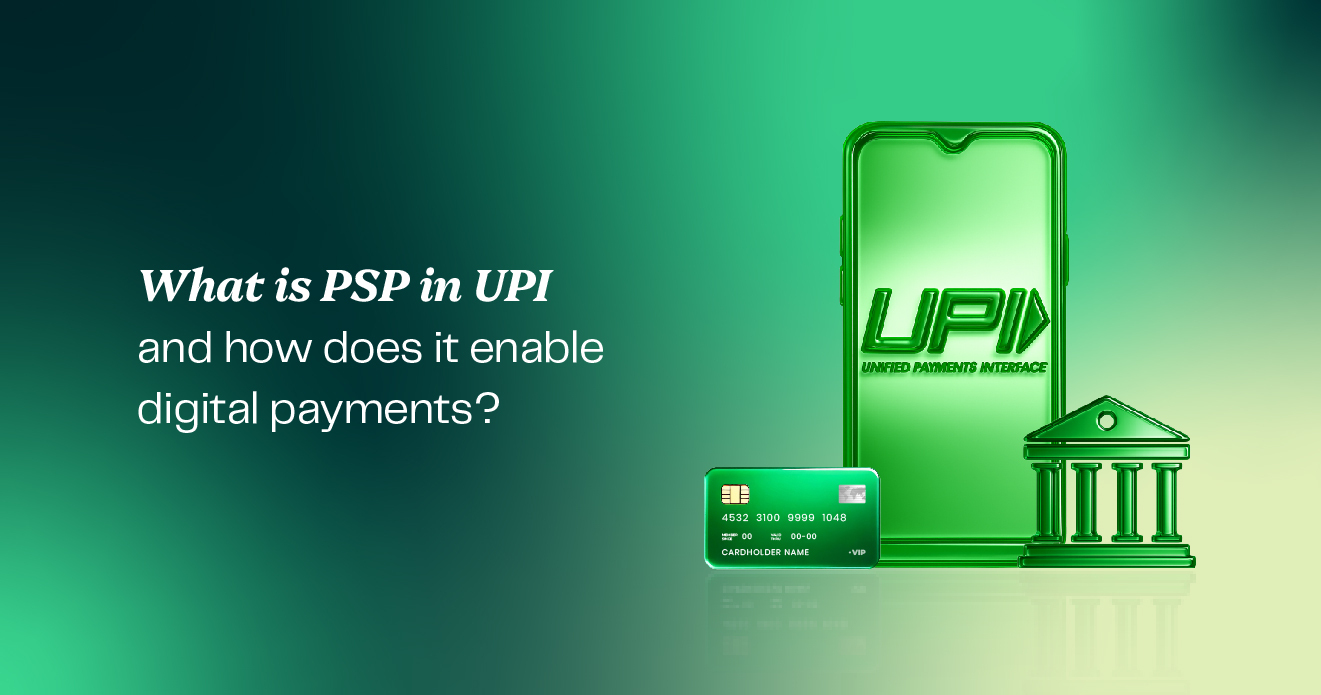As digital payments increasingly replace traditional methods of money exchange, the need to understand the infrastructure behind such seamless systems becomes more relevant than ever. Unified Payments Interface (UPI) has played a transformative role in shaping how people in India transfer funds—quickly, securely and without barriers of time or place. However, few consider the mechanisms that quietly operate behind these interactions. One of the most important components in this process is the PSP in UPI.
This blog explores what PSP in UPI is, the full form of PSP in UPI and how it actively enables and supports the UPI framework.
Understanding what PSP in UPI is
The full form of PSP in UPI is Payment Service Provider. A PSP is an authorised entity—usually a bank or a financial institution—that facilitates UPI transactions on behalf of the user. These providers offer the technical platforms (often in the form of mobile applications) that allow customers to access UPI services.
To put it simply, when a person initiates a UPI transaction using a mobile application such as Google Pay, PhonePe, Paytm or BHIM, the transaction is routed through a PSP in UPI. The PSP acts as the intermediary that connects the user to their bank and to the UPI infrastructure managed by the National Payments Corporation of India (NPCI).
How PSPs work in the UPI payment system
To understand how PSP works, imagine a three-part system:
- Your UPI app: The one you use to make payments.
- Your bank: Where your money is stored.
- The UPI network: Which moves the money between banks.
The PSP connects all three. It provides the platform (the app), connects with your bank to verify and authorise transactions and links to the central UPI system managed by NPCI (National Payments Corporation of India).
Here’s what a PSP typically does:
- Registers new users and links their mobile numbers with bank accounts.
- Manages UPI IDs (VPAs) and PIN setup.
- Authenticates every transaction securely.
- Sends transaction requests to NPCI and receives status updates.
- Offers support and handles any failures or delays in payments.
So, the PSP acts as both the gatekeeper and the communicator in the digital payment journey.
Why PSPs are essential in the UPI ecosystem
Without PSPs, UPI would not function as smoothly or widely as it does today. Here are a few reasons why PSPs are so important:
- They offer user-friendly platforms
Most of the top UPI apps you use are powered by PSPs. They focus on making the interface clean, simple and quick. This helps millions of users, including those unfamiliar with technology, to make payments confidently.
- They maintain safety and trust
Security is a top concern in digital payments. PSPs use multiple layers of security, such as mobile number verification, two-factor authentication, UPI PIN and encryption. This ensures that transactions are secure and sensitive data is protected.
- They handle large volumes efficiently
Every day, millions of UPI transactions are processed in India. PSPs play a key role in handling this traffic, reducing failed transactions and maintaining a fast experience even during peak hours.
The link between banks, NPCI and end users
You might be wondering: how does your money actually move from one bank to another?
When you initiate a payment on your UPI app, the PSP communicates with your bank to check if the account is valid and the balance is sufficient. Then, it sends the payment request to NPCI, which is the body that runs the UPI system. NPCI then contacts the receiver’s bank, and once they accept the request, the money is transferred. All of this takes just a few seconds.
So, the PSP acts as a messenger and a monitor—making sure your request is valid, delivering it correctly and keeping you informed with instant updates.
PSP in UPI and the future of digital payments
As UPI continues to grow—both in India and globally—PSPs will play an even more vital role. They are already expanding into QR code payments, recurring billing and international transactions. Newer technologies like AI-based fraud detection and voice-based payments are also being integrated by PSPs to improve user experience.
With more banks and fintech firms joining the UPI network as PSPs, we can expect even faster, smarter and more secure payment solutions in the future.
Behind every tap, there’s a trusted system
The world of digital payments might look effortless from the outside, but beneath it lies a carefully designed and powerful structure. At the centre of this system stands the PSP in UPI—a key player that ensures every transaction is fast, secure and seamless.
By understanding what PSP in UPI is and how it functions, we gain a better appreciation of the technology that supports our everyday financial interactions. As UPI continues to grow and innovate, PSPs will remain at the forefront—quietly powering the payments of tomorrow.
Whether you are paying a friend or shopping online, now you know the intelligent system that makes it all possible. Our PoS systems further enhance this ecosystem by offering businesses a reliable, integrated platform for accepting both digital and card-based payments with unmatched ease. Learn more at https://www.pinelabs.com/.

